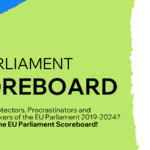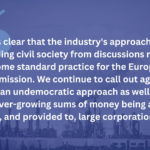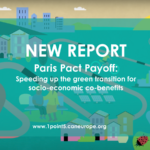Brussels, Bonn — While in Bonn at the UN climate talks the EU touts the Paris Agreement, back in Brussels the European Union is set to continue a funding tool that in last two years has lent billions of euros for fossil fuels projects, finds a new study from CEE Bankwatch Network, CAN Europe, Counter Balance and WWF European Policy Office.
Established in 2015 to leverage private capital with money from the EU budget to guarantee risky loans by the European Investment Bank (EIB), the European Fund for Strategic Investment – also known as the ‘Juncker Plan’ – has since then doled out EUR 1.85 billion for fossil energy, almost 30 percent of its energy loans, and is increasingly funding carbon-intensive transport like motorways and airports, which have received EUR 2.5 billion since the fund’s inception [1].
Backed by the European Commission and the EIB as a strong instrument in the fight against climate change, the Juncker Plan will be under the microscope of the Parliament one last time on Wednesday this week, before MEPs are set to approve a proposal from the Commission for a two-year extension to the fund during a vote next month.
Already blasted by the European Court of Auditors for not clearly proving its worth [2], the Juncker Plan is being further criticised in the NGO report for the shroud of secrecy cloaking its operations. Scant details are offered about the merits of projects that receive an EFSI guarantee, and the fund’s executive body – Investment Committee – does not publish a rationale for its investment decisions, which now total over EUR 20 bn.
ENDS
Quotes:
Anna Roggenbuck, EIB Policy Officer at CEE Bankwatch Network, said: “EFSI clearly fails on sustainability. It is incomprehensible that the EU budget is in a way financing new gas and motorway projects in countries that do not lack for them. It contradicts all of Europe’s green commitments.”
Markus Trilling, Finance and Subsidies Policy Coordinator at Climate Action Network (CAN) Europe, said: “EFSI exposure to fossil fuels breaches the Paris Agreement. The Juncker Plan must work for the climate, not against it.”
Xavier Sol, Director of Counter Balance, said: “As a flagship initiative paving the way for sustainable investments in Europe, EFSI has so far scored poorly on transparency and accountability. In view of its extension, it is imperative that the bar is set much higher: the minutes of its governing bodies need to be regularly disclosed, together with the assessment of projects under the so-called scoreboard of indicators.”
Sebastien Godinot, Economist at WWF’s European Policy Office, said:
“While EU leaders are bragging about their climate leadership at the UN Climate talks, they are financing fossil fuels almost as much as renewables with the Juncker Plan. This schizophrenia must end once and for all. It is up to the European Parliament to ensure consistency with its position on the Paris Agreement.”
Contacts:
Anna Roggenbuck
EIB Policy Officer, CEE Bankwatch Network
annar@bankwatch.org
Mobile: +48 509970424 Office: +48 91 831 5392
Markus Trilling
Finance and Subsidies Policy Coordinator, Climate Action Network (CAN) Europe
markus@caneurope.org
+32 2 8944688
Sebastian Godinot
Economist, WWF European Policy Office
sgodinot@wwf.eu
+32 489 46 13 14
Twitter: @Sebgodinot
Xavier Sol
Director, Counter Balance
xavier.sol@counter-balance.org
+32 473 223 893
Notes:
[1] The new report is available for download at https://bankwatch.org/wp-content/uploads/2017/11/same-thing-EFSI.pdf
[2] See the European Court of Auditor’s report at https://www.eca.europa.eu/en/Pages/NewsItem.aspx?nid=7767
Climate Action Network (CAN) Europe is Europe’s largest coalition working on climate and energy issues. With over 140 member organisations in more than 30 European countries – representing over 44 million citizens – CAN Europe works to prevent dangerous climate change and promote sustainable climate and energy policy in Europe.



